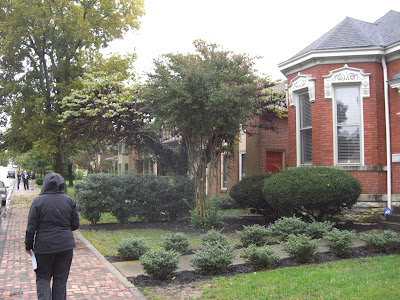Anyone who has ever heard me speak publicly knows that among
my many underlying beliefs is a fairly obvious one about 100-year old
structures. Simply put, while we may
disagree on what to do them or how to regulate them, the one thing we should
all be able to agree upon is that they are not making any more of them.
Earlier this week I trotted that phrase out in a study session,
where a city was evaluating the wisdom of taking the first tentative steps down the road that could lead
to the identification and yes, designation, of some its earliest buildings as “historic.”
This being Oregon, where private
property rights are held in high regard, several participants voiced concern
about maintaining an owner’s ability to do what they want with their property and
not encumbering anyone with a bunch of regulation or "telling" them what to do.
I think property rights are a two-way street. Sure, an owner should have some ability to
use their property as they see fit, unfettered by burdensome regulation. Everyone gets that, if only because millions
of dollars are spent by real estate and property rights advocates to make sure
that we, and our legislators, do. The
other side of the property rights street, however, rarely gets any press. That side is that every property owner should
have the assurance that their NEIGHBORS have some requirement to use their property in a sane and responsible
manner. Put another way, nobody ever wants
“the gummit” telling them what to do,
but nearly everyone, at least anyone living in an urban context, relies upon
the government to corral their crazy neighbors and get the junker cars off the
front lawn, tone down the wild parties, reduce the scale of the mammoth
sun-blocking addition, or re-paint in something (anything!) other than that
awful (fill in the bright color scheme of
your choice).
We all, especially we that call ourselves preservationists, need to understand that historic designation is just a
tool, not an end. I happen to think it’s
an important tool, and I hope you and others agree.
But knowing the history and comparative value associated with a
particular property does not, and in general should not, mandate its
survival by definition. Not all historic properties,
no matter how significant, are capable of being restored to begin with, or even should be restored. Cities, communities, have other values (open
space, habitat restoration, economic development, etc.) that very often, and very
appropriately, outweigh historic values.
It is, ultimately, up to cities, communities, and yes, even property
owners, to weigh each of those values fairly and with full understanding, so as
to determine the best course.
Obviously that choice may not always be historic preservation, and that, sad it can be, is
still entirely understandable.
The thing is, you can’t weigh the value of historic significance, or
the potential benefit of restoration, if you are unaware of history. And you can’t or shouldn’t
relegate historic values to some second tier “it’s nice to do if nothing else is
available” approach, especially if you are leaving that decision up to the property owner. All too often, in our transitory culture where people move on the
average of every few years, a community’s most prized possessions can be placed
in the hands of individuals or entities that have little understanding, or
connection, to its history or culture.
Do you really want McDonald's deciding the future of important resources in your city? And if you are opposed to McDonalds (or Chevron, or whomever) having that power, why on earth would you give that sole authority to Mr. & Mrs. Jones, or "Bill," that nice guy that works at the market?"
Education, knowledge, is a good and
essential thing. Ask any decision-maker worth
his or her salt. Knowing, identifying,
and understanding the history of a community, its context, allows us to fully
appreciate the role that this or that property may play in creating its
character. And in some cases, regulation
to protect key properties with high value to the community as a whole is and
should be an important part of what a forward-thinking community does. Some properties are simply too rare, too
irreplaceable, and too important to the community’s character, to relegate
their existence to the hands of the highest bidder, no matter whom they may be.
All cities live and die, both financially and qualitatively,
by the investment they can encourage, both for new construction and
restoration. It is unrealistic to ask or
expect somebody, anybody, to invest in their property while not providing them
some assurance that if they do, their neighbor won’t put in a Pig Farm, or
God-forbid, a strip mall (!) next door.
Neighbors and communities have property rights too.


No comments:
Post a Comment